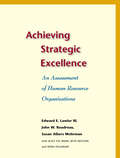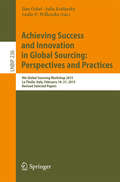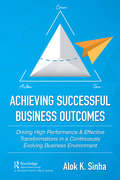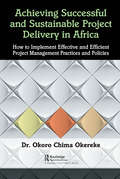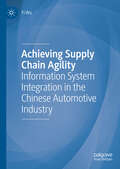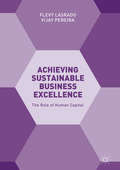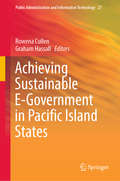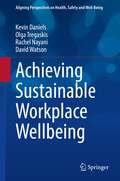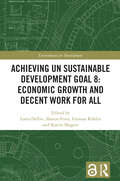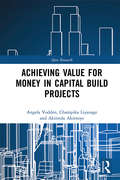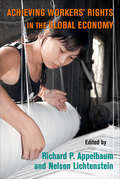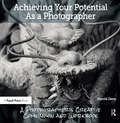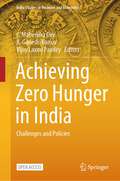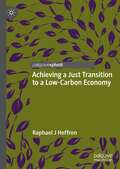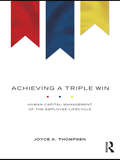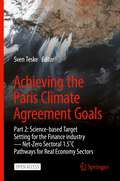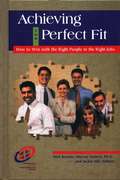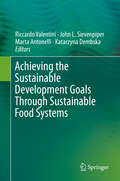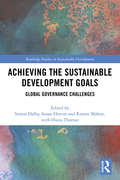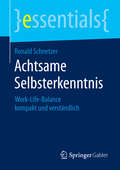- Table View
- List View
Achieving Strategic Excellence: An Assessment of Human Resource Organizations
by Edward Lawler John Boudreau Alice Mark Beth Neilson Center for University of Southern California Nora Osganian Susan MohrmanThis is the Center for Effective Organizations's (CEO) fourth national study of the human resources (HR) function in large corporations. It is the only long-term national study of this important function. Like the previous studies, it focuses on measuring whether the HR function is changing and on gauging its effectiveness. The study focuses particularly on whether the HR function is changing to become an effective strategic partner. It also analyzes how organizations can more effectively manage their human capital. The present study compares data from earlier studies to data collected in 2004. The results show some important changes and indicate what HR needs to do to be effective. Practices are identified that enable HR functions to be high value-added strategic partners.
Achieving Success and Innovation in Global Sourcing: 9th Global Sourcing Workshop 2015, La Thuile, Italy, February 18-21, 2015, Revised Selected Papers (Lecture Notes in Business Information Processing #236)
by Julia Kotlarsky Ilan Oshri Leslie P. WillcocksThis book constitutes revised selected papers from the 9th international Global Sourcing Workshop 2015, held in La Thuile, Italy, in February 2015. The 14 contributions included were carefully reviewed and selected from 40 submissions. The book offers a review of the key topics in outsourcing and offshoring, populated with practical frameworks that serve as a tool kit to students and managers. The range of topics covered is wide and diverse, but predominately focused on how to achieve success and innovation in global sourcing. The topics discussed combine theoretical and practical insights regarding challenges that industry leaders, policy makers, and professionals face. Case studies from various organizations, industries and countries are used extensively throughout the book to illustrate results and findings.
Achieving Successful Business Outcomes: Driving High Performance & Effective Transformations in a Continuously Evolving Business Environment
by Alok K. SinhaAchieving Successful Business Outcomes: Driving High Performance & Effective Transformations in a Continuously Evolving Business Environment (978-1-003-00939-9, 346640) "The missing manual for CXOs who want to understand the reasons their growth strategies are faltering and how to reinvigorate them."Steven Sonsino, London Business School, author of Leadership Unplugged and The Seven Failings of Really Useless Leaders "A valuable and important contribution to our future relevance toolkit!" Anton Musgrave, Futurist and Senior Partner, Future World International "A timely and compelling book that demystifies what it takes to drive change in a volatile and turbulent business environment."Sudhanshu Palsule, author of Rehumanizing Leadership, The Social Leader and Managing in Four Worlds "Not just a compendium of practical business lessons but also a new and powerful extendable model that can be used to evolve, evaluate and execute risk-calibrated business strategies.Piyush Sharma, School of Marketing, Faculty of Business and Law, Curtin University, Australia; Associate Editor, Marketing – Journal of Business Research; Regional Editor – Journal of Knowledge Management "The framework is very innovative and relevant in today’s highly competitive business environments. An important and valuable contribution to improving managerial and organizational effectiveness." Vinod Singhal, Charles W. Brady Chair, Scheller College of Business, Georgia Institute of Technology Navigating in space is exponentially more difficult than navigating on the road – because there are too many directions to investigate, too many unknowns to be prepared for and infinite pathways to chart in the galactic system. So it is with business. Business environments are extremely demanding and change continuously, precipitated by innumerable actors and conditions. Business success cannot be predicated on the pedigree of a leader or a prescribed theory alone, as start-ups have amply proven. Large companies have tried to copy nimble-footed start-ups while start-ups, after achieving a certain size, have been forced to adapt to unchartered territory. Disruptions seems to be the order of the day. This book is about achieving successful business outcomes. An aircraft has a complex dashboard of dials, where only a critical few need to be monitored continuously, and other subsets warrant attention only during specific phases of the flight. A well-modeled business can be managed successfully using a similar strategy. But the larger question is how to model a business, with closely correlated variables, to represent the reality of the environment and to allow for devising, formulating and adjusting business strategy and actions in real-time. The author uses a simple but well-researched STA-Triangle (space, time and action) model to achieve this purpose. The core of the STA model is to help navigate effectively in a rapidly changing business environment. Unlike traditional business studies that use a single lens to define business rules or organizational practices, it uses the combination of space, time and action as the driver of outcomes – something fundamental and core to human thinking across the ages. This book contains both theoretical and practical applications – the former helps propel further research and analysis and the latter helps practicing leaders confidently drive their firms forward in any environmental conditions. It will also help causal readers understand how the future is evolving and how different organizations are responding to this change. The author includes more than a hundred supporting examples and tools that help create highly incisive and unique views for calibrating strategy and execution.
Achieving Successful and Sustainable Project Delivery in Africa: How to Implement Effective and Efficient Project Management Practices and Policies
by Dr. Okoro OkerekeAfrican nations have an underdeveloped industrial and economic base such as their water supply, electrical systems, roads, railways, etc. Massive funding is required to build each of these basic services to the levels of developed nations – funding they don’t have. Many African countries rely on assistance from the government and global companies looking to invest or facilitate projects in the region. And for a variety of reasons, many of these projects fail or are inadequate to fulfil the needs of the nation. In order to facilitate their own economic development, African nations need to cultivate efficient project management practices and policies that will help them achieve their goal of sustainability. This book by a multidisciplinary project management consultant, contributes to the body of knowledge that each African country can attain and sustain economic development by suggesting how to eliminate and correct most causes of failures of projects in construction, water treatment, electricity and renewable energy. It suggests that they should also be able to obtain the sustainable harvesting of the benefits of project deliverables which have been planned for in order to implement the various aspects of their economic development. The suggestions in this book will make a difference in project delivery and are comprehensive enough to create a root-and-branch change which will affect the people involved in making decision on projects and their delivery. Thus, project management teams and their managers, organization decision makers, companies looking to invest in the region, and politicians who plan the economy have to understand the causes of unhelpful practices and what needs to be done in order to produce productive and effective delivery of long-term sustainable project. The principal goal of this book is to advise public and private companies, and international organizations conducting projects in Africa on how to prepare themselves, their businesses and enterprises to solve the problems that cause failure of projects and abandonment of project deliverables. The book also recommends the necessity for a commercial enterprise or government entity to prepare and develop its vision, mission, and strategic objects to constitute the basis of a business plan which should be implemented for successful operations. After first identifying various failed and abandoned projects in Nigeria, Ghana and South Africa, the author provides an analysis of why these projects failed or were abandoned. By using methodologies of Organizational Project Management (OPM), Project Portfolio Management (PPM) and project management techniques, he suggests a framework for project delivery which could be used as a foundational structure and platform that will address the problem and provide solutions for the achievement of successful and sustainable project delivery in Africa.
Achieving Supply Chain Agility: Information System Integration in the Chinese Automotive Industry
by Yi WuThis book identifies factors of information system (IS) integration that influence supply chain agility and illustrates how IS integration can achieve greater supply chain agility. Also considering the consequent operational impacts that arise from IS-enabled supply chain agility, the author presents real-life examples through interviews and surveys to explore how IS integrations affect supply chain agility in the context of the Chinese automotive industry. The ability to swiftly respond to competitive challenges is a key element in industry 4.0 and organisations with agile supply chains are better prepared to respond to uncertainties and changes. This book develops and presents guidelines on the deployment of information system integration in order to achieve efficient agile supply chains.
Achieving Sustainable Business Excellence: The Role Of Human Capital
by Vijay Pereira Flevy LasradoCompiling the best practices of business excellence frameworks around the world, this new book addresses the need for innovative research on sustainable business performance. Using detailed empirical studies, the authors outline the motives and benefits of the implementation of such frameworks in different geographical regions. Comprehensive case studies showcase how the variety of excellence frameworks are manifested in their work cultures, values and beliefs. Academics studying quality management, HRM, and international business will find this book an essential read as it establishes the relevance of human capital in achieving and sustaining global business excellence.
Achieving Sustainable E-Government in Pacific Island States (Public Administration and Information Technology #27)
by Rowena Cullen Graham HassallThis book analyzes the common set of obstacles to the development and integration of government Information and Communication Technology (ICT) projects and effective e-government initiatives in developing countries. It draws on the expertise and experience of more developed states in the Pacific, notably Australia and New Zealand, both highly rated in global rankings for e-government and active in a variety of e-government development projects across the region. There has been a general failure to identify priorities and align projects with local needs in ICT/e-government projects. Small Island Developing States (or SIDS) present a unique problem in terms of e-government. Not only do they suffer from a common set of barriers to ICT development such as their remoteness, geographical dispersion, moist tropical climates, largely rural populations, and lack of ICT capacity and infrastructure, but are also dependent on external agencies for investment, and must negotiate with powerful donors who have conflicting agendas. E-government is widely regarded as 'transformational', increasing efficiency, productivity, accountability, economic growth, and citizen involvement. But while the governments of SIDS are committed to harnessing ICTs for effective government and economic development, they face major challenges in establishing successful e-government initiatives, due to the problems outlined above, coupled with a lack of HR capacities and appropriate strategies and policies. Drawing on the experience of the states mentioned above, as well as regional quasi-governmental bodies, nongovernmental organizations (NGOs), aid agencies, and the private sector, the book will be of interest to researchers and students in the fields of e-government, public administration, political science, communication, information science, and social media.
Achieving Sustainable Workplace Wellbeing (Aligning Perspectives On Health, Safety And Well-being Ser.)
by David Watson Kevin Daniels Olga Tregaskis Rachel NayaniIn this groundbreaking interdisciplinary work, the authors focus on organizational analysis to understand workplace wellbeing, deviating from previous research that mostly looks at the individual worker or intervention. In addressing the question of why workplace health and wellbeing practices initiatives fall short of delivering sustained improvements in worker wellbeing, this book moves beyond localized explanations of the failure of specific interventions. Instead, it creates theoretical frameworks that explain how wellbeing at work can be improved and sustained. The authors use evidence from systematic and comprehensive surveys of the literature as well as new empirical research, and present an explanatory framework of the processes through which organizations change to implement and accommodate workplace health and wellbeing practices. Learning, adaptation and continuation explain successful implementation of workplace health and wellbeing practices, while Gestalting, fracturing and grafting explain how organizations resolve or negotiate conflict between health and wellbeing practices and existing organizational procedures, systems and practices. In addition, the authors reflect on the implications for research of reframing the unit of analysis as the organization and how studies on workplace wellbeing practices can provide a conceptual platform for thinking about the way organizations can create social value in a broader sense. This book, authored by experts in their field, is a great resource for academics and professionals of organizational studies and of worker wellbeing across the social sciences, behavioural sciences, business and management courses, wellbeing research, and labour studies.
Achieving UN Sustainable Development Goal 8: Economic Growth and Decent Work For All (Environment for Development)
by Gunnar Köhlin Lotta Dellve Sharon Fonn Katrin SkagertThis book brings together knowledge on how to achieve the UN Sustainable Development Goal 8, to bring societal change through sustainable economic growth and decent work for all by 2030.At its core is the great challenge of achieving economic growth without compromising the environment, while ensuring respect for fundamental human rights, and in particular the right to employment with equal and safe work conditions. This book provides a critical analysis of Sustainable Development Goal (SDG) 8 in the 2030 Agenda, its targets and indicators, to reveal biases, tensions and contradictions that need to be addressed to achieve this goal and to guide policymaking. The role and potential of academia to contribute to achieving this SDG is scrutinized. Chapters examine and assess specific targets for SDG 8, which includes policies, resource efficiency, youth employment, child labour and sustainable tourism. Higher education institutions’ tools for capacity building are presented, examining how education and academic research can play a role in achieving the SDG 8 targets. Overall, this book offers a synthesis of how research and higher education can make a difference in achieving a complex SDG.This book will be of great interest to academics and professionals working on the United Nations Sustainable Development Goals and can be used as a policymaking guide for 2030 and beyond.
Achieving Value for Money in Capital Build Projects (Spon Research)
by Akintola Akintoye Angela Vodden Champika LiyanageThis book is the first to bring together academic and practitioner views of Value for Money (VFM). VFM has been used to assess whether or not an organisation has obtained the maximum benefit within the resources available to it. A concept used by the public sector to assess the benefits of major built environment projects, it has become a major tenet of public private partnerships, capital project infrastructure and civil engineering megaprojects. This book presents and discusses the various debates surrounding the concept of Value for Money. It provides an international perspective on VFM by drawing upon the existing and fast developing body of principles and practices for Capital Build Projects. Readers will gain a level of understanding of the issues involved, the challenges, opportunities and the support mechanisms and protocols required for implementation of VFM in capital building development. Ultimately, the book presents a protocol that has been developed to track and monitor the VFM of a capital project from day 1, an Equilibrium Testing Mechanism (ETM) developed by the authors. This testing mechanism allows each of the parties to a project to monitor their VFM position at any given stage of a project from the beginning to the end of the build stage and beyond as necessary. This book is both a useful reference for researchers and a practical guide for the construction and engineering industry.
Achieving Workers' Rights in the Global Economy
by Nelson Lichtenstein Richard AppelbaumThe world was shocked in April 2013 when more than 1,100 garment workers lost their lives in the collapse of the Rana Plaza factory complex in Dhaka. It was the worst industrial tragedy in the two-hundred-year history of mass apparel manufacture. This so-called accident was, in fact, just waiting to happen, and not merely because of the corruption and exploitation of workers so common in the garment industry. In Achieving Workers' Rights in the Global Economy, Richard P. Appelbaum and Nelson Lichtenstein argue that such tragic events, as well as the low wages, poor working conditions, and voicelessness endemic to the vast majority of workers who labor in the export industries of the global South arise from the very nature of world trade and production.Given their enormous power to squeeze prices and wages, northern brands and retailers today occupy the commanding heights of global capitalism. Retail-dominated supply chains—such as those with Walmart, Apple, and Nike at their heads—generate at least half of all world trade and include hundreds of millions of workers at thousands of contract manufacturers from Shenzhen and Shanghai to Sao Paulo and San Pedro Sula. This book offers an incisive analysis of this pernicious system along with essays that outline a set of practical guides to its radical reform.Contributors: Mark Anner, Penn State University; Richard P. Appelbaum, University of California, Santa Barbara; Jennifer Bair, University of Colorado Boulder; Renato Bignami, labor inspector, Brazil; Jeremy Blasi, UNITE HERE Local 11, Los Angeles, and Penn State; Anita Chan, Australian National University; Jenny Chan, University of Oxford; Jill Esbenshade, San Diego State University; Gary Gereffi, Duke University; Jeff Hermanson, International Union League for Brand Responsibility; Jason Kibbey, Sustainable Apparel Coalition; Nelson Lichtenstein, University of California, Santa Barbara; Xubei Luo, World Bank; Anne Caroline Posthuma, International Labour Organization; Scott Nova, Worker Rights Consortium; Ngai Pun, Hong Kong Polytechnic University; Katie Quan, University of California, Berkeley; Brishen Rogers, Temple University; Robert J. S. Ross, Clark University; Mark Selden, Cornell University and New York University; Chris Wegemer, Santa Barbara, California
Achieving Your Potential As A Photographer: A Creative Companion and Workbook
by Harold DavisComing from the perspective that true inspiration and great image making are at the core of any high-level photographic endeavour, Achieving Your Potential as a Digital Photographer presents an organized and cohesive plan for kickstarting creativity, and then taking the resulting work into the real world. The ideas presented have been formulated by Harold Davis over many years working as a creative artist and award-wining photographer, and in the celebrated workshops he has developed and led all around the world. These concepts are presented with accompanying exercises so that readers can put them into everyday practice as well as workbook pages bound into the book for note taking and journaling. This book will enrich your photographic practice whether the goal is simply to enrich your photography or to make money from your work.
Achieving Zero Hunger in India: Challenges and Policies (India Studies in Business and Economics)
by S. Mahendra Dev A. Ganesh-Kumar Vijay Laxmi PandeyThis open access volume discloses rich set of findings and policy recommendations for India towards achieving the SDG 2.1 target of zero hunger by 2030. Through its fourteen chapters, it takes an integrated approach by examining diverse aspects of food and nutrition security through multidisciplinary lens of Agricultural Economics, Nutrition, Crop Sciences, Anthropology and Law, while being rooted in economics. The chapters reflect this diversity in disciplines in terms of the questions posed, the data sets used, and the methodologies followed. Starting from the evolution of policy response for hunger and nutrition security, the book covers aspects such gender budgeting, dietary diversity, women’s empowerment, calorie intake norms, socio-legal aspects of right to health, subjective wellbeing, bio-fortification, crop insurance and food security linkages, interdependence of public distribution system (for food security) and employment guarantee schemes especially during COVID-19 pandemic, effects of dairy dietary supplements, and so on. With its rich discussions, the book is compelling for students, researchers, policy makers, development professionals and practitioners working in areas of food and nutrition security, SDGs, in particular SDG1, SDG2 and SDG5, and sustainable food systems.
Achieving a Just Transition to a Low-Carbon Economy
by Raphael J HeffronThe ambition of most countries across the world is to develop a low-carbon economy, evidenced by the fact that the vast majority of countries have signed the Paris COP21 agreement. This book contends that this global societal transition to a low-carbon economy must be just. As such, it will be an invaluable and accessible reference for scholars from all research disciplines who aim in their research to see a fairer, more equitable and inclusive world where sustainability is at the fore and climate targets are achieved.This is the first in-depth and original analysis to explore the central importance of law in achieving a just transition to a low-carbon economy. In addition, it advances the JUST framework, a unique framework for assessing the just transition. This important research and theoretical tool provides a practical perspective as it ensures the geographical space and timelines of development are factored into analysis. The research also provides analysis on the just transition movement around the world and the influence of international institutions.Through several case studies on Just Transition Commissions and Critical Mineral Development, the book details and demonstrates key elements of justice, including distributive, procedural, restorative, recognition, and cosmopolitan justice. It is clear from the analysis that while these are vast areas for analysis, if applied in practice, they all centrally contribute to ensuring society will advance in achieving a just transition to a low-carbon economy.
Achieving a Triple Win: Human Capital Management of the Employee Lifecycle
by Joyce A. ThompsenTraditionally, organizations have left human capital needs to the human resources department. However, the talent management landscape has changed. Managers have begun to recognize that attracting and employing highly talented individuals makes an enormous impact on the company’s bottom line. The ‘Human Capital Cycle’ model presented in Achieving a Triple Win: Human Capital Management of the Employee Lifecycle presents a more systematic and comprehensive approach to human capital management based on the author’s insight into the connection between and organization’s strategy and its human capital needs and plans. Focusing on the six stages of the employee lifecycle, the book emphasises the need for a more adaptive, specialised approach to HRM to achieve what the author calls the ‘Triple Win’ – substantial benefits for customers, employees and the business as a whole. The book includes: rich descriptions and examples details on how to plan and execute each stage questions and issues case studies This book is a useful resource for senior leaders, decision makers, HR professionals and those responsible for talent management in the private and public sectors. Students of HRM and management would find this an enlightening supplementary reading.
Achieving and Maintaining Price Stability in Nigeria
by Batini NicolettaFinancial report from the IMF
Achieving the Advice Advantage: Managers Must Partner with Lawyers for Business Success
by Constance E. BagleyThis chapter shows managers how to collaborate more effectively with their lawyers to craft the best overall strategy and tactics for achieving core business objectives while minimizing legal risks and costs.
Achieving the Paris Climate Agreement Goals: Part 2: Science-based Target Setting for the Finance industry — Net-Zero Sectoral 1.5˚C Pathways for Real Economy Sectors
by Sven TeskeThis open access book is designed as a continuation of the editor’s 2019 book Achieving the Paris Climate Agreement Goals. This volume provides an in-depth analysis of industry sectors globally, and its purpose is to present emission reduction targets in 5-year steps (2025 to 2050) for the main twelve finance sectors per the Global Industry Classification System. This scientific analysis aims to support the United Nations Principles for Responsible Investment initiative to give sustainability guidance for the global finance industry. The industry sector pathways presented here are based on the latest global and regional 100% renewable energy and non-energy greenhouse gas Representative Concentration Pathways in order to keep climate change significantly under +1.5 C and thereby achieve the Paris Climate Agreement goals. The heart of this book is three chapters presenting the results of industry scenario modelling. These chapters cover twelve industry and service sectors as well as transportation and buildings. The specific energy demand and specific emissions are presented based on the emission accounting concept of “Scope 1, Scope 2 and Scope 3” emission pathways. This methodology has been developed to measure the climate and sustainability index for companies, and this research project expands the methodology to apply it to entire industry sectors. The results presented here are the first overall industry assessments under Scope 1, 2 and 3 from 2020 through 2050. The base for the energy pathways is the scenarios scenarios published in the previous volume. The nonenergy GHG emission scenarios, broken down to agriculture & forestry and industry, are detailed and include all major greenhouse gases and aerosols. The final section of the book presents the main conclusions of the industry pathway development work and recommendations for the finance industry and policy makers. Additionally, future qualitative future investment requirements in specific technologies and measures are presented.
Achieving the Perfect Fit
by Jackie Hill Nick Boulter Murray Dalziel, Ph.D.Tap the skills of your most vital resource—employees. This book shows you how to improve individual and organizational performance by aligning corporate strategy with the management of people. You will learn why some people are more successful than others and how that can work for your organization.Whatever your role---CEO, manager, or human resource professional---Achieving the Perfect Fit guides you in how your organization can use employee skills and talents to gain the competitive edge. This book shows you how to:Improve your competitive position Get the right people for the right job Relate pay to skills Manage cultural differences Develop the leaders of tomorrow An impressive team of international human resource management consultants provides you with new contributions and up-to-the-minute case studies.Attain business success through leveraging individual performance with Achieving the Perfect Fit. Tap the skills of your most vital resource—employees. This book shows you how to improve individual and organizational performance by aligning corporate strategy with the management of people. You will learn why some people are more successful than others and how that can work for your organization. Whatever your role---CEO, manager, or human resource professional---Achieving the Perfect Fit guides you in how your organization can use employee skills and talents to gain the competitive edge. This book shows you how to: *Improve your competitive position *Get the right people for the right job *Relate pay to skills *Manage cultural differences *Develop the leaders of tomorrow An impressive team of international human resource management consultants provides you with new contributions and up-to-the-minute case studies. Attain business success through leveraging individual performance with 'Achieving the Perfect Fit.'
Achieving the Sustainable Development Goals Through Sustainable Food Systems (Food And Health Ser.)
by Marta Antonelli Riccardo Valentini John L. Sievenpiper Katarzyna DembskaThis publication offers a systemic analysis of sustainability in the food system, taking as its framework the Sustainable Development Goals of the 2030 Agenda of the United Nations. Targeted chapters from experts in the field cover main challenges in the food system and propose methods for achieving long term sustainability. Authors focus on how sustainability can be achieved along the whole food chain and in different contexts. Timely issues such as food security, climate change and migration and sustainable agriculture are discussed in depth. The volume is unique in its multidisciplinary and multi-stakeholder approach. Chapter authors come from a variety of backgrounds, and authors include academic professors, members of CSO and other international organizations, and policy makers. This plurality allows for a nuanced analysis of sustainability goals and practices from a variety of perspectives, making the book useful to a wide range of readers working in different areas related to sustainability and food production. The book is targeted towards the academic community and practitioners in the policy, international cooperation, nutrition, geography, and social sciences fields. Professors teaching in nutrition, food technology, food sociology, geography, global economics, food systems, agriculture and agronomy, and political science and international cooperation may find this to be a useful supplemental text in their courses.
Achieving the Sustainable Development Goals: Global Governance Challenges (Routledge Studies in Sustainable Development)
by Susan Horton Simon Dalby Rianne Mahon Diana ThomazThis book draws on the expertise of faculty and colleagues at the Balsillie School of International Affairs to both locate the Sustainable Development Goals (SDGs) as a contribution to the development of global government and to examine the political-institutional and financial challenges posed by the SDGs. The contributors are experts in global governance issues in a broad variety of fields ranging from health, food systems, social policy, migration and climate change. An introductory chapter sets out the broad context of the governance challenges involved, and how individual chapters contribute to the analysis. The book begins by focusing on individual SDGs, examining briefly the background to the particular goal and evaluating the opportunities and challenges (particularly governance challenges) in achieving the goal, as well as discussing how this goal relates to other SDGs. The book goes on to address the broader issues of achieving the set of goals overall, examining the novel financing mechanisms required for an enterprise of this nature, the trade-offs involved (particularly between the urgent climate agenda and the social/economic goals), the institutional arrangements designed to enable the achievement of the goals and offering a critical perspective on the enterprise as a whole. Achieving the Sustainable Development Goals makes a distinctive contribution by covering a broad range of individual goals with contributions from experts on governance in the global climate, social and economic areas as well as providing assessments of the overall project – its financial feasibility, institutional requisites, and its failures to tackle certain problems at the core. This book will be of great interest to scholars and students of international affairs, development studies and sustainable development, as well as those engaged in policymaking nationally, internationally and those working in NGOs.
Achieving your TAQA Assessor & Internal Quality Assurer Award
by Ann GravellsThis focused and comprehensive text from Learning Matters is written specifically for TAQA trainee assessors and internal quality assurers. The content covers all three assessor and all three internal quality assurance units and all chapters are cross referenced to the standards. Easy-to-read and clearly structured, the text is accessible and includes activities and examples throughout to help trainees link theory with practice. TAQA trainees will find this text both an invaluable resource for their course and a useful handbook to take into practice.
Achtergronden van farmaceutische patiëntenzorg (Basiswerk AG)
by Jeroen MentinkDit boek gaat in op het leveren van farmaceutische patiëntenzorg. Om deze zorg goed te kunnen leveren is het noodzakelijk meer te weten over onderwerpen die daar een belangrijke rol bij spelen: denk aan medicatieveiligheid, het goed uitvoeren van medicatiebewaking, polyfarmacie, de invloed van therapietrouw en de samenwerking tussen de verschillende zorgverleners, zoals de huisarts, de praktijkondersteuner, de thuiszorg, de specialisten in het ziekenhuis en andere apotheken. In het boek is ook aandacht voor de rol van de mantelzorger, de zorg aan de patiënt die niet meer beter wordt (palliatieve zorg) en de kwaliteit van zorg die elke apotheek moet leveren.Achtergronden van farmaceutische patiëntenzorg is een geheel nieuw boek. Het heeft zijn eigen plek gekregen naast het standaardwerk Farmacotherapie voor apothekersassistenten. Het boek sluit door de inhoud naadloos aan op de onderdelen B1-K1 ‘Voert geïndividualiseerde farmaceutische patiëntenzorg uit’, B1-K1 ‘Verleent niet-receptgestuurde zorg aan de patiënt’ en B1-K4-W3 ‘Werkt multidisciplinair samen en stemt werkzaamheden af (samenwerking)’ uit het Kwalificatiedossier. Daarnaast is het boek bij uitstek geschikt om ingezet te worden bij het keuzedeel ‘Specifieke doelgroepen voor de apothekersassistent’. In Nederland is het begrip ‘farmaceutische patiëntenzorg (FPZ)’ in 1993 geïntroduceerd. Bij farmaceutische patiëntenzorg vindt een intensievere begeleiding van patiënten plaats door de apotheek. Het doel is dat de patiënt zijn geneesmiddelen zo effectief, correct en veilig mogelijk gebruikt. Dit kan alleen als het apotheekteam de patiënt goed kan informeren over de geneesmiddelen, de toediening en het doel of belang van de behandeling. Farmaceutische patiëntenzorg wordt geleverd door het hele apotheekteam. Achtergronden van farmaceutische patiëntenzorg is geschikt voor iedereen die de opleiding tot apothekersassistent volgt. Daarnaast is het als naslagwerk erg handig in de dagelijkse praktijk van de apotheek.Jeroen Mentink is openbaar apotheker in Zierikzee. Naast zijn werkzaamheden als apotheker is hij actief in het onderwijs en heeft hij ruime ervaring met (na)scholing van apothekers, farmaceutisch consulenten en apothekersassistenten. Verder heeft hij zitting in diverse (vakinhoudelijke) commissies en is hij actief als auteur van scholingen en naslagwerken.
Achtsame Selbsterkenntnis: Work-Life-Balance kompakt und verständlich (essentials)
by Ronald SchnetzerImmer mehr Menschen verbringen die besten Jahre ihres Lebens mit einem Job, den sie nicht mögen, um immer mehr Dinge zu kaufen, die sie nicht brauchen, um einen Lebensstil zu führen, den sie nicht genießen. Tatsachen, die bei manchen Zeitgenossen stilles Kopfnicken auslösen. Doch anstatt zu handeln, geht man zur Tagesordnung über und verschreibt sich dem Prinzip Hoffnung: ,,Irgendwann wird's schon besser. " Doch weit gefehlt! Ronald Schnetzer beleuchtet das Thema aus einem neuen Blickwinkel. Er zeigt, wie Selbsterkenntnis mit Work-Life-Balance zusammenhängt und sich privat und geschäftlich positiv auswirkt. Anhand von prägnanten Beispielen und eindrücklichen Erlebnisberichten zeigt er, wie man Achtsame Selbsterkenntnis umsetzt, um damit glücksfähiger zu werden.
